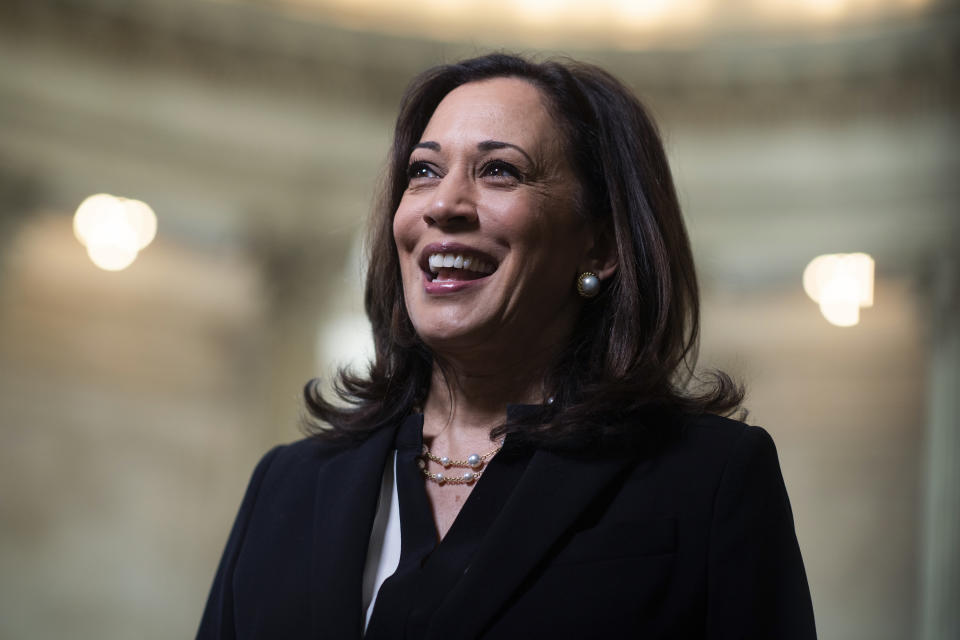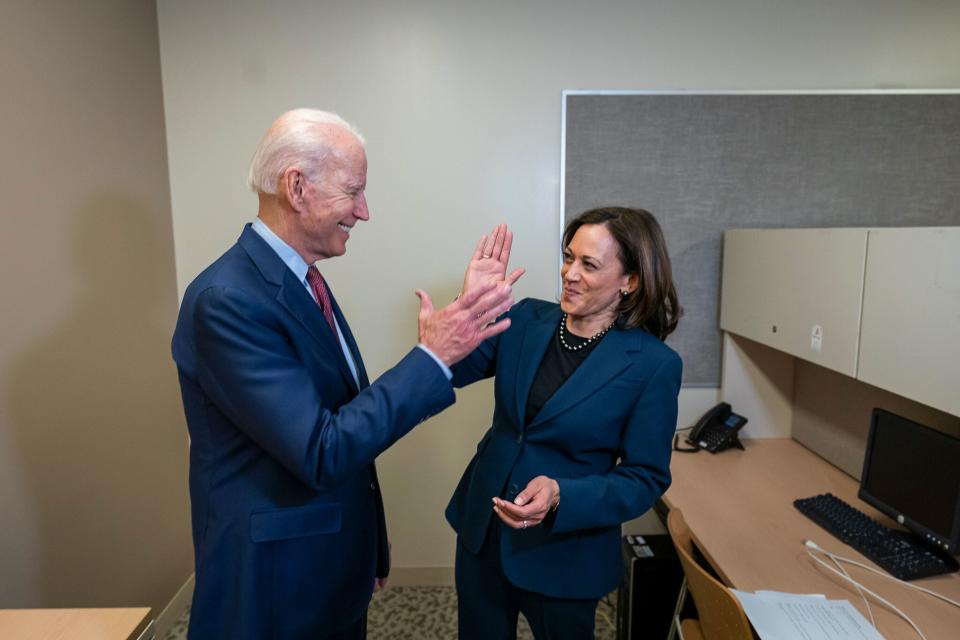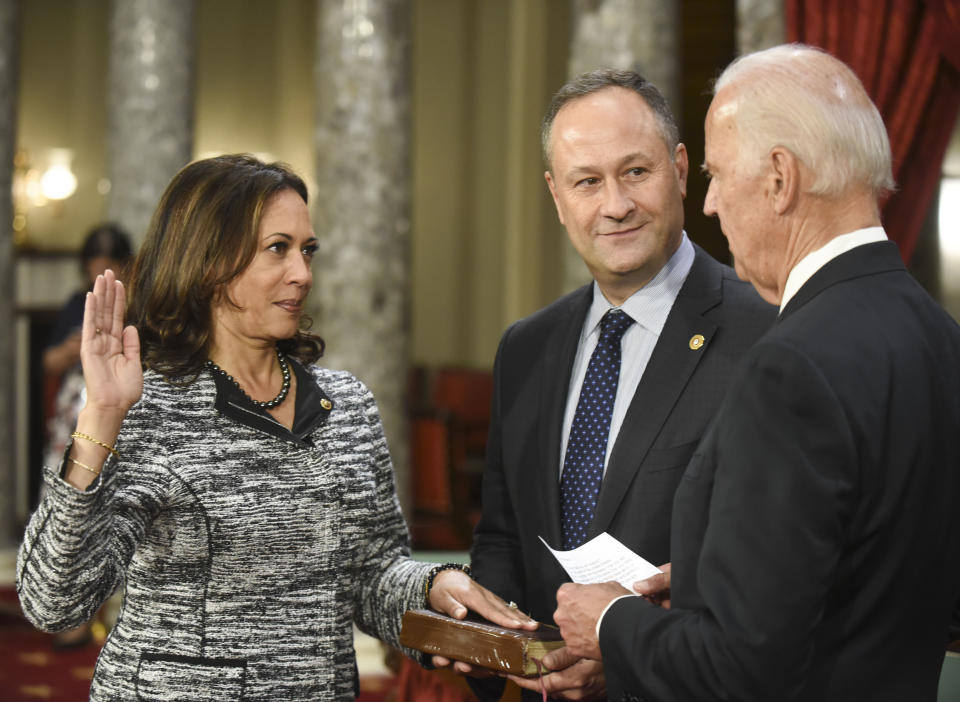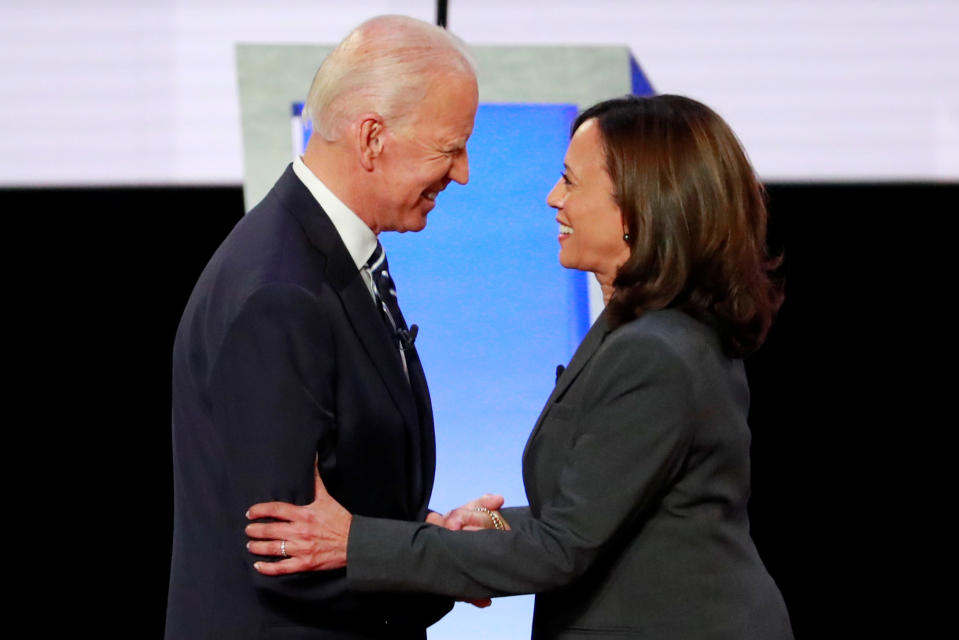The steady, determined rise of Kamala Harris
WASHINGTON — Kamala Harris won her first election in 1983, earning a seat to a student body council at Howard University. She had only recently arrived there, a native of California of mixed-race heritage studying at the nation’s premier historically Black university.
For four decades, Harris would not lose an election, rising relentlessly through the powerful Democratic establishment of California. And when she did notch her first loss, in 2019’s primary for the Democratic nomination for the presidency, she still came out a victor of sorts, with the presumptive nominee, Joe Biden, selecting her on Tuesday as his vice presidential nominee.
Given Biden’s age — he would be 78 on inauguration day — and the expectations both he and others have for his 55-year-old vice presidential pick, Harris could be the most influential second-in-command since Dick Cheney, who guided the George W. Bush administration through the response to the Sept. 11 attacks. That would put her in stark contrast to the current vice president, former Indiana Gov. Mike Pence, who has been an unfailingly dutiful deputy to President Trump.
One conservative commentator wrote after Tuesday’s announcement that voters should be prepared for “Harris-Biden rule.”

Some progressives, meanwhile, have looked askance at her prosecutorial record, which has come into especially sharp relief in the wake of this summer’s protests against police brutality. Harris has also been criticized for her role in the settlement with banks following the 2007-08 foreclosure crisis.
It is not clear how much traction those criticisms — which have followed Harris for years — will have on voters. Antjuan Seawright, a Democratic strategist in South Carolina, predicted that “heated fellowship” among Democrats would not hurt the party’s chances of regaining the White House. “Very healthy pick. This party is better because of people like Kamala Harris,” Seawright argued, describing her not only as a battle-tested politician but as a mother and sister who can display the empathy Americans may well need in a time of national crisis (she has two stepchildren, who call her Momala).
Harris’s relative centrism could be what makes her palatable to suburban white voters in the Midwest, who helped Trump defeat Hillary Clinton in 2016. “The safest possible pick, which is what any candidate who is currently in the lead wants,” says veteran Republican pollster Whit Ayres.
That appeared to be the consensus, with Democrats quick to unite around the ticket ahead of the Democratic National Convention and what is sure to be a bruising fall campaign season.
“I feel so blessed,” said Rep. Val Demings, D-Fla., one of several women of color whom Biden vetted in the last several months. “To see a Black woman nominated for the first time reaffirms my faith that in America there is a place for every person to succeed, no matter who they are or where they come from.”

Harris came from Berkeley, the very-left-of-center town where her parents had met as University of California graduate students. After graduating from Howard, she returned to the Bay Area for law school at the Hastings College of the Law, a branch of the University of California in San Francisco.
But even though she was back in the crucible of 1960s protests, she seemed to grasp the limits of activism. So did others who had grown disenchanted with how little demonstrations had seemingly changed the political situation, with former conservative California Gov. Ronald Reagan now president of the United States.
Instead of choosing a field like civil rights law, Harris became a deputy district attorney in Alameda County, which encompasses Berkeley, Oakland and other East Bay municipalities. In 1998 she went to work as a prosecutor and city attorney in San Francisco.
She first sought elected office in 2003, when she prevailed in a tough contest against her former boss (and relative progressive) Terence Hallinan, the incumbent, to become San Francisco’s district attorney. She deftly used that position as a platform to run for state attorney general in 2010, portraying herself as a reformer but not a radical. She was, controversially, against the death penalty. But she was also against legalizing the recreational use of marijuana.

When she ran for reelection in 2014, both Donald and Ivanka Trump donated to her campaign.
If anything, Harris has always been careful not to offend corporate sensibilities, seemingly aware that being labeled a progressive crusader could damage her national standing. In 2015, for example, she was presented with the persuasive case that nutrient company Herbalife was engaged in a pyramid scheme that preyed on the people it persuaded to market its products. But the prospect of going after a politically powerful corporation appeared to discomfit Harris, and she took no action, despite a strong, detailed recommendation from her own deputies.
Trump’s own rise coincided with Harris’s emergence as a national figure. She ran for the Senate in 2016, looking to fill the seat that Sen. Barbara Boxer was intending to vacate at the end of that congressional session. Harris became a senator on the same November evening that saw Trump take the White House.
In her victory speech, Harris struck a defiant tone. “Do not despair,” she told her supporters. “Do not be overwhelmed.” She was sworn in by Joe Biden (then the outgoing vice president to Barack Obama) on Jan. 3, 2017. Thirty-four years after that first Howard election, she was back in Washington.

Were she to become vice president, Harris would be the first woman to hold that title, as well as the first Black person (her father is Jamaican) and the first Asian-American (her mother was Indian). Her husband, attorney Douglas Emhoff, would be the first Jewish person to ever occupy the vice president’s residence at the Naval Observatory (and if Harris were to ever become president, he would also be the first Jewish person to reside in the White House).
Her selection as Biden’s running mate is a testament to her savvy approach to serving in the Senate. She did not immediately set about making friends with Republicans and crafting legislation, having seemingly grasped that as much as Americans bemoaned Washington’s unremitting gridlock, the Democratic voters who would be crucial to her future expected their elected representatives to battle Trump at every turn.
That is in contrast to the conciliatory approach of Sen. Amy Klobuchar, D-Minn., who prepared for a presidential run by working with Republicans on relatively uncontroversial, small-bore bills. That made Klobuchar one of the most effective Democrats in the Senate, a fact she routinely touted during her 2020 presidential run. But while Klobuchar became a favorite of pundits, three years under Trump left Democrats with little patience for aisle crossing.
Harris, on the other hand, delivered what Democrats were looking for, in large part through her seat on the powerful Senate Judiciary Committee, where she sat alongside fellow future Democratic presidential nomination rivals Klobuchar and Sen. Cory Booker, D-N.J.

She quickly emerged as a prolific tormentor of Trump nominees and appointees, who seemed to frequently wither in the face of her unrelenting questioning. “I’m not able to be rushed this fast; it makes me nervous,” Attorney General Jeff Sessions told her during a June 2017 hearing, in a moment that went viral.
There would be many more such moments during the hearing to consider the nomination to the Supreme Court of Brett Kavanaugh, who had been accused of carrying out an attempted sexual assault many years before. At points, Harris seemed to hint that she had damning evidence against Kavanaugh, who appeared to have made a number of misstatements in his written and verbal testimony. No such evidence ever materialized, but the moment lingered as a cultural touchstone for many Democrats: a woman of color challenging the scion of white privilege.
Trump recalled the Kavanaugh hearings on Tuesday upon learning of Harris’s selection, complaining that she had been “extraordinarily nasty” to the nominee.
Harris also took on William Barr, Trump’s second attorney general, whom Democrats accused of subverting the law in order to help the president politically. “Kamala Harris Guts Barr Like a Fish, Leaves Him Flopping on the Deck,” went the headline of a Vanity Fair article following a May 2019 hearing concerning the investigation into Russian electoral interference during the 2016 presidential election.
The impeachment of the president gave her more opportunities to excoriate Trump and his allies for what she and other Democrats called an abuse of power. And as the only Black woman in the Senate, she has served as her party’s spokesperson during the recent spate of antiracism protests. A fight with Sen. Rand Paul, R-Ky., who had held up an anti-lynching bill, produced yet another viral moment.
At the same time, she never developed a fully coherent political outlook of her own during her first term as a U.S. senator. That much became apparent when she announced her run for president in early 2019. The announcement came before an estimated crowd of 20,000 in Oakland, in what pundits quickly deemed a show of force.

But once she actually began to campaign, Harris struggled to articulate a clear rationale for her candidacy. At times she resorted to the kind of rhetoric that had roused the supporters of Barack Obama a decade before. Voters, however, were looking for something more. “She didn’t really go into details,” one prospective voter told Yahoo News in February 2019 as Harris campaigned in Iowa. “And I think we want to know the details.”
The Trump campaign will try to use uncertainty about where she stands to its advantage. That strategy was in evidence on Tuesday, when Trump campaign senior adviser Katrina Pierson charged in a call with reporters that Harris “wants to eliminate private health insurance.” Harris had at one point supported the plan by Sen. Bernie Sanders, I-Vt., to enact a single-payer health-insurance system. But she subsequently backed away from that proposal, leaving some dispirited and some confused, while also reviving broader questions about what she actually believed.
After poor finishes in early-voting states, Harris dropped out of the presidential campaign. And despite having attacked Biden on the issue of school desegregation during one of the presidential debates, she quickly endorsed him with “great enthusiasm.”
Biden’s selection of a Black woman as his running mate comes as he fends off criticism that he has antiquated, potentially troubling views on race. By selecting Harris, says strategist Seawright, “Biden looked his critics in the face.” The question, of course, is whether Harris will be given a Cheney- or Pence-sized portfolio; that is, whether she will primarily be a messenger for Biden or a substantive governing partner.

The dynamic between Biden and Harris will now come under intense scrutiny, with race, gender and age all potentially playing a role. And then there is the question of Harris’s own desire to become president. Chris Dodd, a former U.S. senator from Connecticut who helped run the vice presidential selection process, warned about her supposed lack of trustworthiness.
The Trump campaign is already hard at work trying to portray Harris as a leftist, part of a broader effort to foment unease among suburban voters. “Biden is nothing more than a Trojan horse for the radical left’s extreme agenda, and Phony Kamala is eager to fill his empty shell,” read a press release from the president’s reelection campaign.
But her record as a prosecutor could also blunt Trump’s accusations that Biden seeks to “destroy” the suburbs with his policies. Those accusations have accompanied antiracism protests that have shaken American cities throughout the summer and have sometimes been accompanied by looting and violence. At the same time, some have depicted Harris as having been too zealous as the top prosecutor in San Francisco and all of California. She does not support defunding or abolishing law enforcement departments, though she does endorse “reimagining public safety.” That puts her in line with Biden and, as a matter of fact, most Americans.
And the desire to defeat Trump is almost certain to override any worries about Harris’s progressive credentials. As the Republican pollster Ayres predicted, “The left will be fine.”
_____
Read more from Yahoo News:



